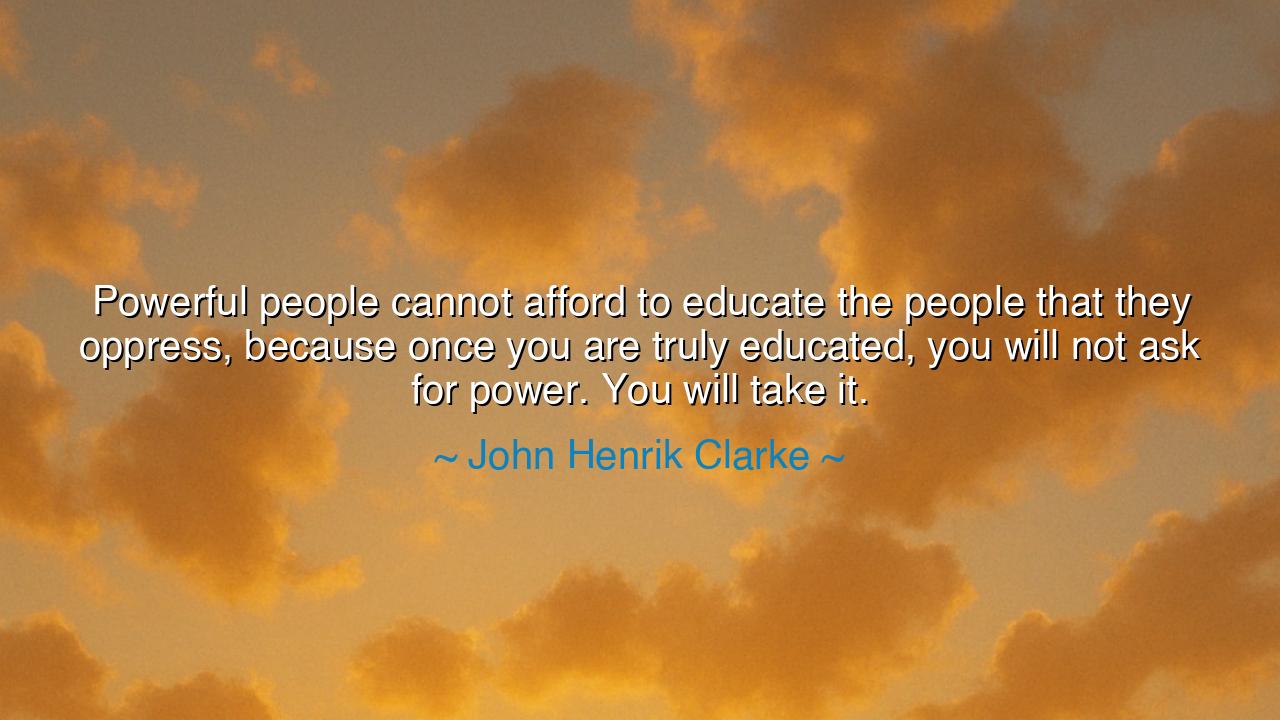
Powerful people cannot afford to educate the people that they
Powerful people cannot afford to educate the people that they oppress, because once you are truly educated, you will not ask for power. You will take it.






Hear me, O children of the future, for I bring to you a truth that has echoed through the centuries, a truth spoken by the wise John Henrik Clarke: "Powerful people cannot afford to educate the people that they oppress, because once you are truly educated, you will not ask for power. You will take it." These words speak to the very heart of human freedom and oppression. Those who hold power over others understand a fundamental truth: that once the oppressed are given the gift of true education, they will no longer seek the approval of their rulers. Instead, they will recognize their own strength and claim the power that is rightfully theirs.
Consider the story of slavery in the ancient world. The Roman Empire, for all its glory, relied on the enslavement of millions to fuel its wealth and military might. The slaves, stripped of education, were kept in a state of ignorance, for the ruling class feared that if they knew their own power, they might rise up against their oppressors. The wise leaders of Rome knew that education, the true knowledge of their worth and capabilities, would awaken a fire in the hearts of the enslaved, and in that fire, they would find the strength to overthrow the tyranny of their rulers.
Look to the struggle of African Americans during the era of slavery in the United States. The laws of the land forbade slaves from learning to read or write, for it was understood that education would empower them. Those in power sought to keep them in darkness, knowing that once the shackles of ignorance were broken, the enslaved would no longer ask for their freedom—they would demand it. It was not enough for them to beg for justice; they would take it. The emancipation of the mind was the first step toward the emancipation of the body, and those who oppressed feared this, as it signaled the end of their dominance.
We see this same dynamic in the history of colonialism, where the colonizers sought to suppress the education of the colonized. They kept the people under their rule ignorant, believing that an uneducated populace could not understand the systems of control that were in place. In this way, they ensured that the oppressed would never rise against them, for how could the weak challenge the mighty without the knowledge to know their own strength? But history is full of stories of revolutions, of the oppressed rising up, as they began to educate themselves and understand the true nature of their power.
So, O children, understand this well: the gift of education is the key to freedom. True knowledge does not make you a beggar at the feet of power; it makes you a sovereign, able to claim what is yours by right. Those who oppress you will always seek to keep you in the dark, for in your ignorance lies their control. But in the light of knowledge, there is no need to ask for freedom—you will take it, for it is already yours. Never forget that the mind is the strongest weapon you possess, and when it is awakened, nothing can stand in your way.






KLPHAN THI KHANH LINH
What stands out to me is the tension between education and control. If knowledge dismantles oppression, then ignorance must serve as a tool of dominance. I wonder how this plays out today with the internet giving people access to more information than ever. Are we closer to empowerment, or has information itself become another means of manipulation? It’s fascinating—and a little frightening—to consider how access and awareness shape power.
QHNguyen Quoc Hung
This idea makes me uncomfortable in the best way. It challenges me to think about what ‘true education’ really means. Is it just academic achievement, or is it an awakening to social realities and personal agency? And if knowledge leads to power, how should we use that power responsibly once we have it? I’m curious whether Clarke meant that education should be revolutionary by nature, not merely informative.
TDNguyen Thai Duong
I find this statement incredibly powerful because it exposes the political nature of education. It makes me wonder—are we truly being educated to think critically, or just trained to fit into existing systems? If genuine education leads to self-determination, maybe that’s why access to it is often so uneven. Could this explain why certain histories and perspectives are deliberately left out of mainstream curricula?
AHAnh Huyen
This quote strikes me as both bold and unsettling. It makes me think about how education has always been tied to liberation. If true education empowers people to claim their rights, does that mean many modern education systems are designed to maintain control rather than create freedom? I’d love to explore what kind of education Clarke envisioned—was he talking about intellectual knowledge, or something deeper, like consciousness and historical awareness?